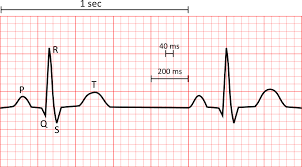Understanding the Vital Significance of ECG in Healthcare

In the realm of modern medicine, diagnostics play a pivotal role in assessing and monitoring cardiovascular health. Among these diagnostic tools, the Electrocardiogram (ECG or EKG) stands out as a cornerstone in the evaluation of the heart’s electrical activity. This non-invasive test has proven invaluable in providing crucial insights into heart health, aiding healthcare professionals in making informed decisions and promoting timely intervention. In this blog post, we will delve into the importance of ECG and why it is considered a fundamental component of cardiovascular care.
Detecting Abnormal Heart Rhythms:
One of the primary functions of an ECG is to detect abnormal heart rhythms, also known as arrhythmias. By recording the electrical impulses generated by the heart, an ECG can identify irregularities in the heartbeat pattern, whether it’s a rapid, slow, or irregular rhythm. This early detection is instrumental in preventing potentially life-threatening conditions associated with abnormal heart rhythms.
Diagnosing Heart Attacks:
In cases of suspected heart attacks or myocardial infarctions, an ECG is often one of the first diagnostic tools employed. The test can quickly reveal signs of a heart attack by identifying abnormalities in the heart’s electrical conduction system, such as ST-segment elevation or depression. Early detection allows for prompt and appropriate intervention, minimizing damage to the heart muscle.
Assessing Cardiac Chamber Enlargement:
An ECG can provide valuable information about the size and condition of the heart’s chambers. Enlargement of the heart’s chambers may be indicative of various cardiovascular conditions, including heart failure or valvular disorders. This information is crucial for healthcare professionals to formulate appropriate treatment plans and interventions.
Monitoring Medication Effects:
For individuals with heart conditions, ongoing monitoring is essential to assess the effectiveness of medications. Regular ECGs enable healthcare providers to observe changes in the heart’s electrical activity, ensuring that prescribed medications are producing the desired effects and adjusting treatment plans if necessary.
Screening for Cardiac Abnormalities:
In some cases, individuals may undergo routine ECG screenings as part of preventive healthcare. This proactive approach can detect subtle abnormalities or risk factors for heart conditions before they manifest as symptoms. Early detection allows for lifestyle modifications or medical interventions to mitigate potential risks.
Guiding Surgical Interventions:
For individuals requiring cardiac surgeries or interventions, pre-operative and post-operative ECGs are invaluable. These tests provide a baseline assessment of cardiac function before surgery and monitor the heart’s response to interventions, guiding healthcare professionals in ensuring a safe and successful procedure.
The Electrocardiogram is more than just a diagnostic tool; it is a lifeline in cardiovascular healthcare. From identifying irregular heart rhythms to detecting signs of heart attacks and guiding treatment decisions, the importance of ECG cannot be overstated. Regular ECG screenings, whether as part of routine check-ups or in response to specific symptoms, empower healthcare professionals to take proactive measures to safeguard cardiovascular health. As a non-invasive, quick, and highly informative test, ECG stands as a testament to the advancements in medical technology that continue to enhance patient care and outcomes. Contact Health at Homes for ECG services at home in Hyderabad.







